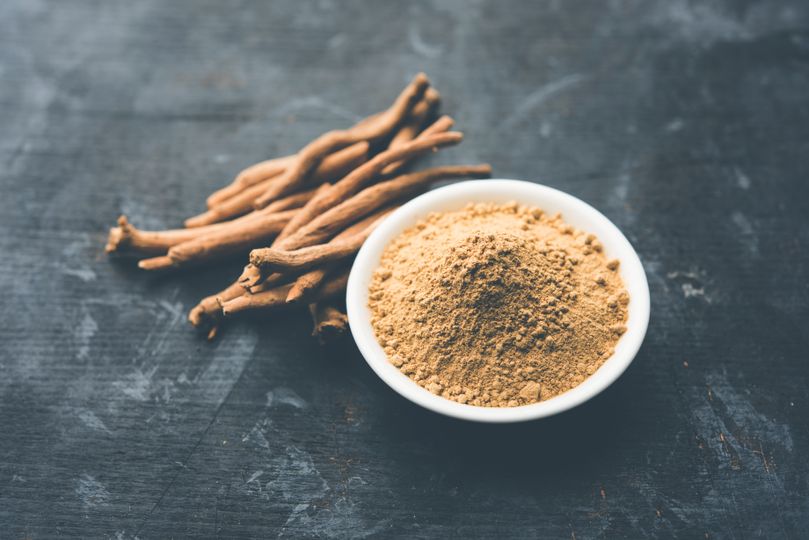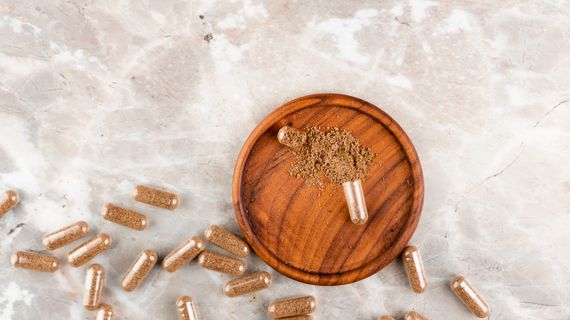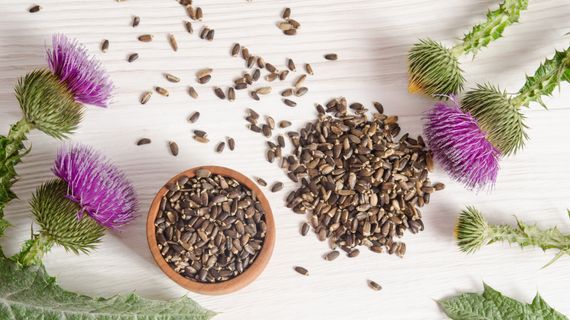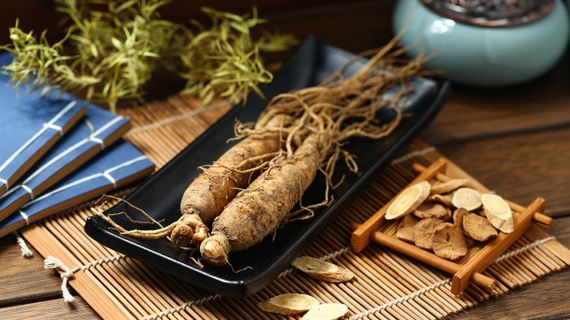- Ashwagandha, also known by its botanical name Withania somnifera, is a small plant with yellow flowers native to India and North Africa.
- Its root has been used for over 3000 years as a natural Ayurvedic remedy.
- Modern science associates it with health benefits such as reducing stress and anxiety and improving blood sugar, mood and memory.
Have you heard of ashwagandha? It is a plant used in traditional medicine of Eastern cultures and in the teachings of Ayurveda. This is due to its attributed positive effects, ranging from mental health support to an energy and vitality boost. This article takes a closer look at ashwagandha, exploring its benefits as well as its risks and possible dosage.
What is ashwagandha?
Ashwagandha is part of a class of plants called adaptogens, renowned for their health benefits when ingested in the form of tea, powders and supplements or in their raw form. You can also find it under the names Indian ginseng, winter cherry or Withania somnifera. Ashwagandha is especially popular for its ability to modulate stress and anxiety. It has been and continues to be an important part of centuries‑old Ayurveda, the traditional system of medicine in India, where it was also used to treat a number of ailments, such as rheumatism and insomnia.
8 potential effects of ashwagandha
Alleviates stress and anxiety
Ashwagandha is perhaps best known for its ability to reduce stress. It is classified as an adaptogen, a substance that helps the body cope with stress. A 2019 study found that a daily dose of 240mg of ashwagandha root extract significantly reduced stress levels in humans compared to a placebo. This included lower levels of cortisol (a stress hormone). In another small study, taking 250 or 600mg of ashwagandha extract for eight weeks also significantly reduced perceived stress and cortisol levels compared to a control group. What's more, participants who took ashwagandha supplements experienced significant improvements in sleep quality.
Benefits in athletic performance
An analysis of research involving 12 studies on men and women who took doses of ashwagandha ranging from 120mg to 1,250mg per day suggests that the herb may enhance physical performance and oxygen utilization during exercise. In addition, ashwagandha helps increase muscle strength. In one study, men taking 600mg of ashwagandha daily for eight weeks experienced significantly greater increases in muscle strength and size compared to those in the placebo group.
Cardiovascular support
Some people use ashwagandha to improve heart health, including reducing high blood pressure and high cholesterol. One 2015 study suggested that an extract of the root could indeed improve a person's cardiorespiratory endurance. However, more research is needed to confirm this hypothesis.
Improves symptoms of mental illness
In one study, researchers examined the effects of ashwagandha on people with schizophrenia who suffered from depression and anxiety. Those taking 1,000mg of ashwagandha extract daily for 12 weeks experienced fewer feelings of depression and anxiety than the placebo group. In addition, findings from another study suggest that taking ashwagandha may help improve overall symptoms and perceived stress in people with schizophrenia. Despite these results, ashwagandha should by no means be used as a replacement for antidepressants. If considering its inclusion in your diet, consult your doctor or another healthcare professional first.
Helps increase testosterone and fertility in men
In one study, 43 overweight men aged 40‑70 took tablets of ashwagandha extract daily for eight weeks. The treatment was associated with an 18% greater increase in DHEA‑S, a sex hormone involved in testosterone production. In addition, a review of four studies found that ashwagandha treatment significantly increased sperm concentration, volume and motility in men with low sperm counts. However, the researchers concluded that there is currently insufficient data to confirm the potential benefits of ashwagandha for male fertility, and further high‑quality studies are needed.
Blood sugar regulation
Limited evidence suggests that ashwagandha may have some benefits for people with diabetes or high blood sugar. A review of 24 studies, including five clinical trials in people with diabetes, found that ashwagandha therapy significantly reduced blood sugar, hemoglobin A1c (HbA1c), insulin, blood lipids, and markers of oxidative stress. However, further research is needed in this area as well.
Improves sleep
Many people use ashwagandha to promote restful sleep, and some evidence suggests that it may help with sleep problems in particular. For example, a study on adults aged 65‑80 found that taking 600mg of ashwagandha root extract daily for 12 weeks significantly improved sleep quality and mental alertness upon waking, compared to a placebo treatment.
Improves brain function, including memory
Taking ashwagandha may benefit cognitive function. One review involving five clinical trials, noted evidence of improved cognitive function with ashwagandha use in certain populations, including older adults with mild cognitive impairment and people with schizophrenia. Another study on 50 adults showed that taking 600mg of ashwagandha extract daily for eight weeks led to significant improvements in immediate and general memory, attention and information processing speed.

Things to note
Ashwagandha is generally considered a safe and non‑toxic plant. However, there are several factors to consider before introducing it as a daily supplement. If you are taking other medications, you should consult your doctor or another health professional before incorporating anything new into your health routine, including ashwagandha. This herb, like any other, can potentially increase or decrease the effects of other medications.
Pregnant or breastfeeding women, as well as people with autoimmune diseases (such as lupus, rheumatoid arthritis, type 1 diabetes and Hashimoto's thyroiditis), should also consult their doctor before including ashwagandha in their regimen.
How to take ashwagandha
There is quite a big difference between taking the dried powder of the root versus a standardized extract. With the powdered form, the amount of active ingredients is typically lower. In contrast, the extracts are most often sold standardized for total withanolide content, usually greater than 5%, with the more expensive ones exceeding 7%. The typical dosage for these extracts is around 500‑600 mg per day, particularly for the aforementioned stress‑relieving effects, possibly to support libido and vitality.
Recently, there has also been a lot of talk about the KSM‑66 brand extract. This is a full‑spectrum ashwagandha extract derived solely from the root, preserving all the natural constituents of the herb in their original balance. The extraction process of KSM‑66 involves pre‑treatment of the roots with milk, which helps retain both hydrophilic and lipophilic components, ensuring a high potency of the extract. This process aligns with traditional Ayurvedic methods and texts. Herein lies the patented process, which took 14 years to develop and implement. One of the few that rival it is Sensoril, also standardized for withanolide content, extracted from both the root and the leaf. It is highly potent, full‑spectrum, and supported by a long list of proven health benefits proven in clinical studies.
It is not recommended to exceed the recommended daily dose listed on the product packaging. In some cases, taking high doses may lead to unpleasant side effects, including indigestion, diarrhea, nausea and vomiting.
Organic KSM‑66® Ashwagandha
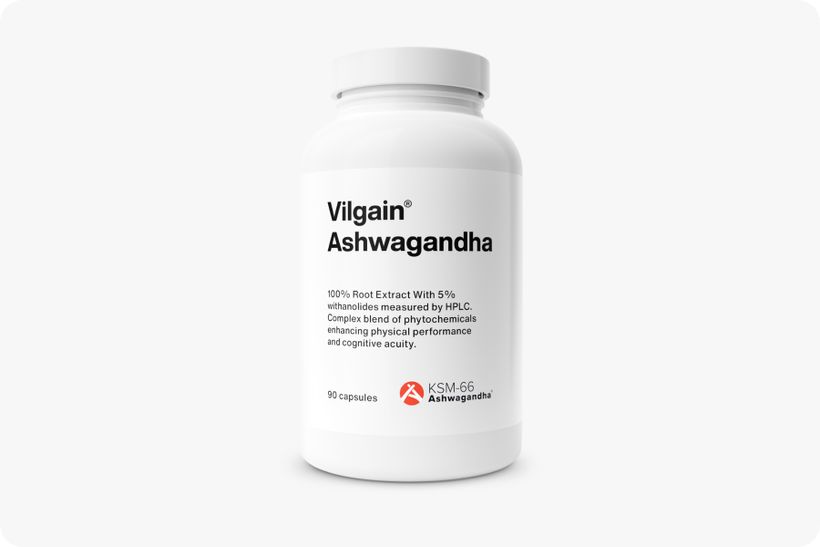
Bottom line
Ashwagandha, also known as Indian ginseng or winter cherry, is a herb whose roots and orange‑red berries have been used for hundreds of years for medicinal purposes. These include boosting energy, regulating stress and anxiety, and improving brain function. While these and other findings are promising, more research on humans is needed to fully confirm their effectiveness.
On the other hand, caution is advised when combining ashwagandha with other medications or including it in the diet during pregnancy, breastfeeding, and for people with autoimmune diseases. Last but not least, it is advisable to keep an eye on the quality of the product and choose standardised extracts rather than powder, which contains a small and often insufficient amount of active substances.


